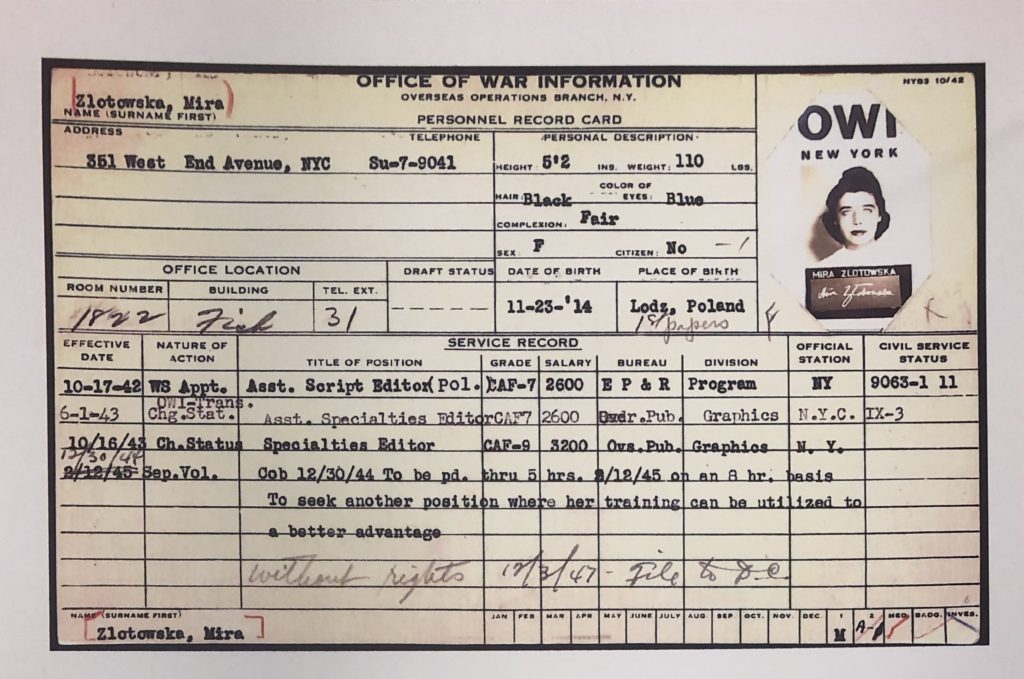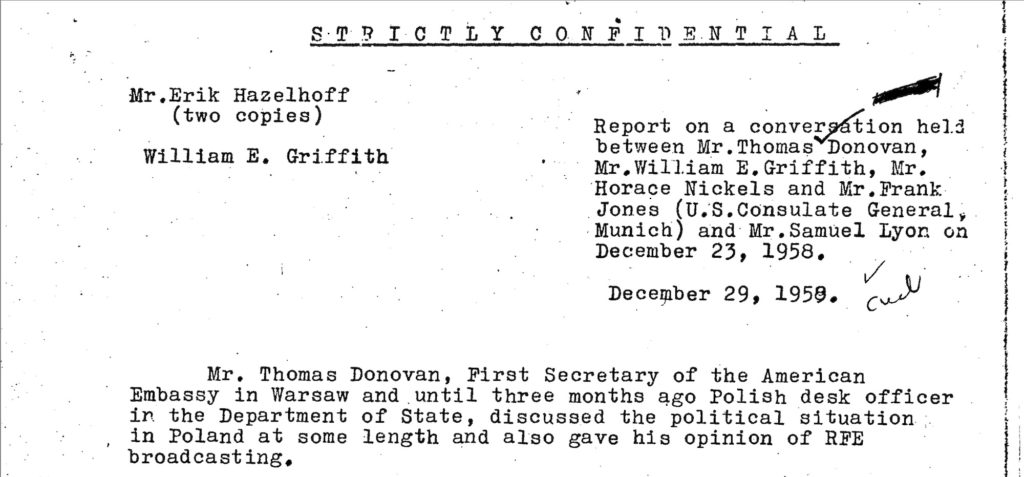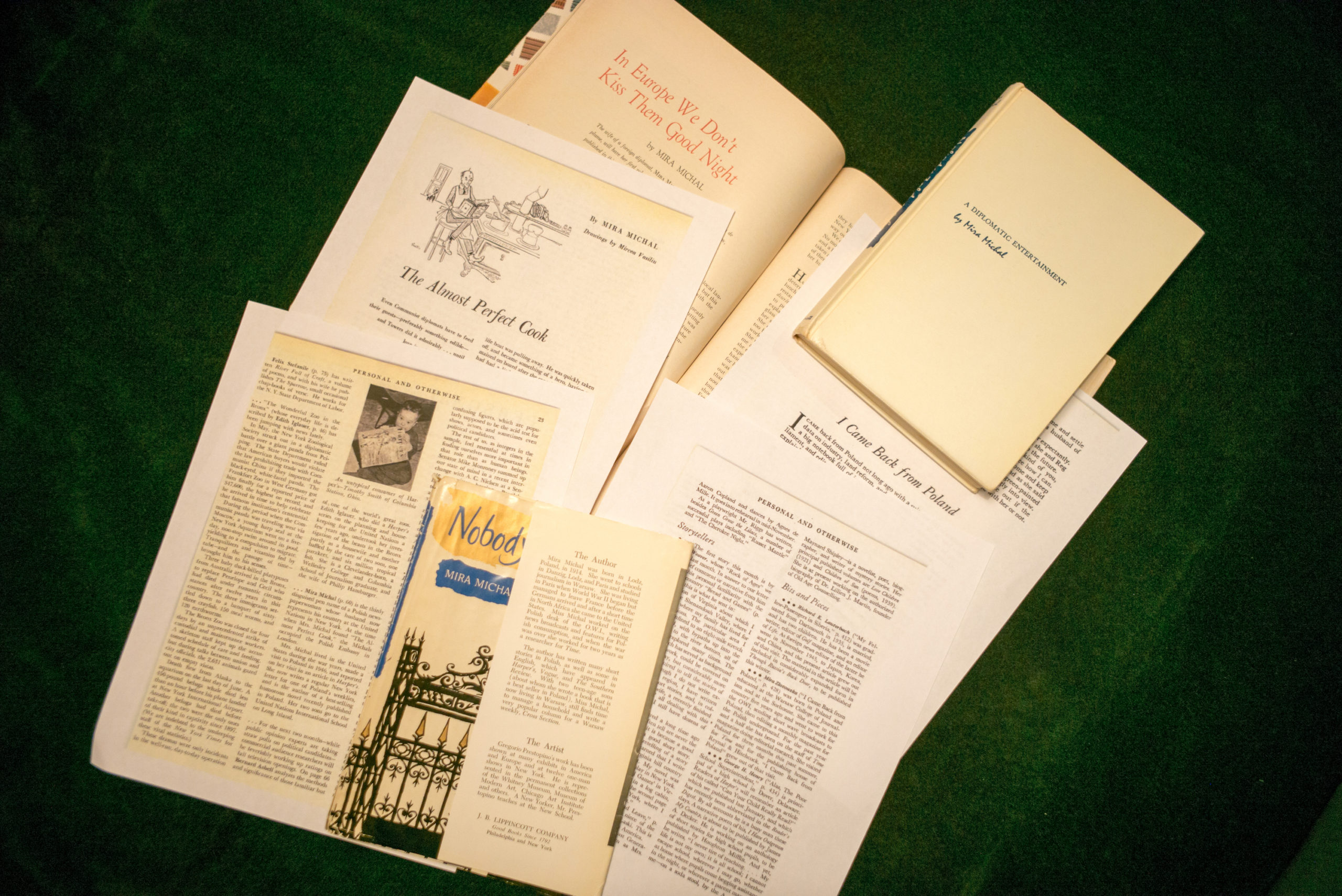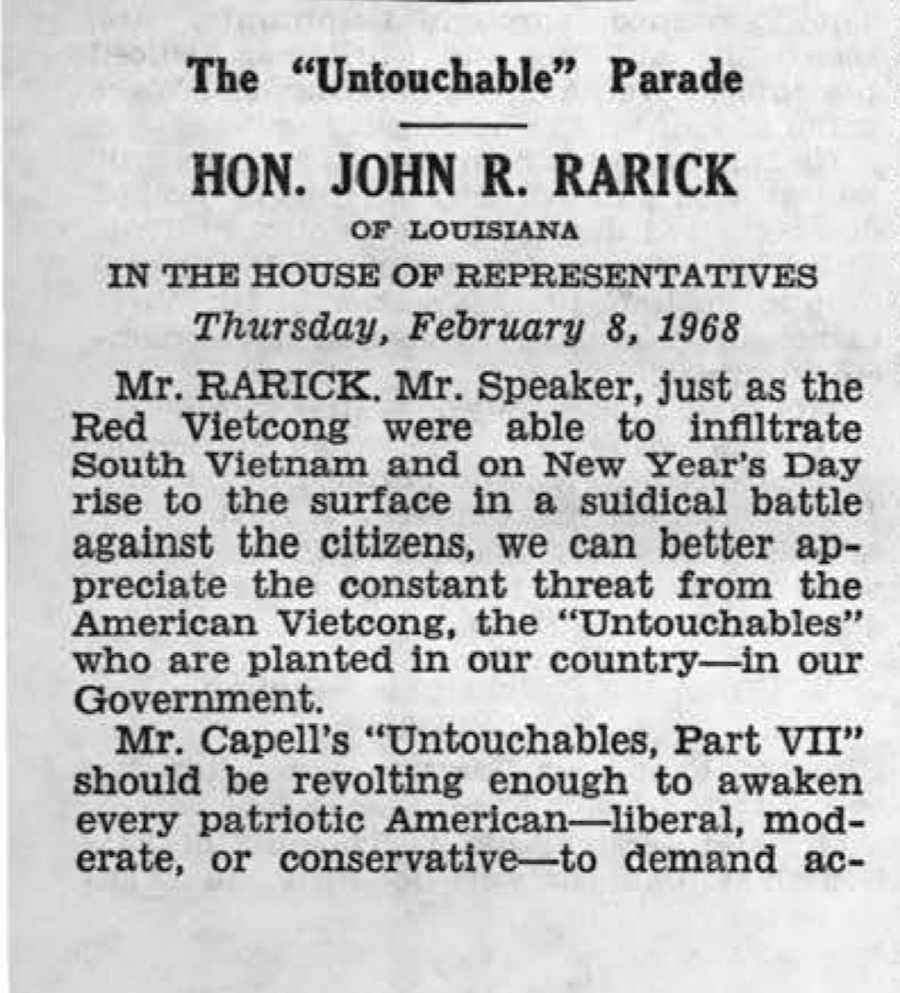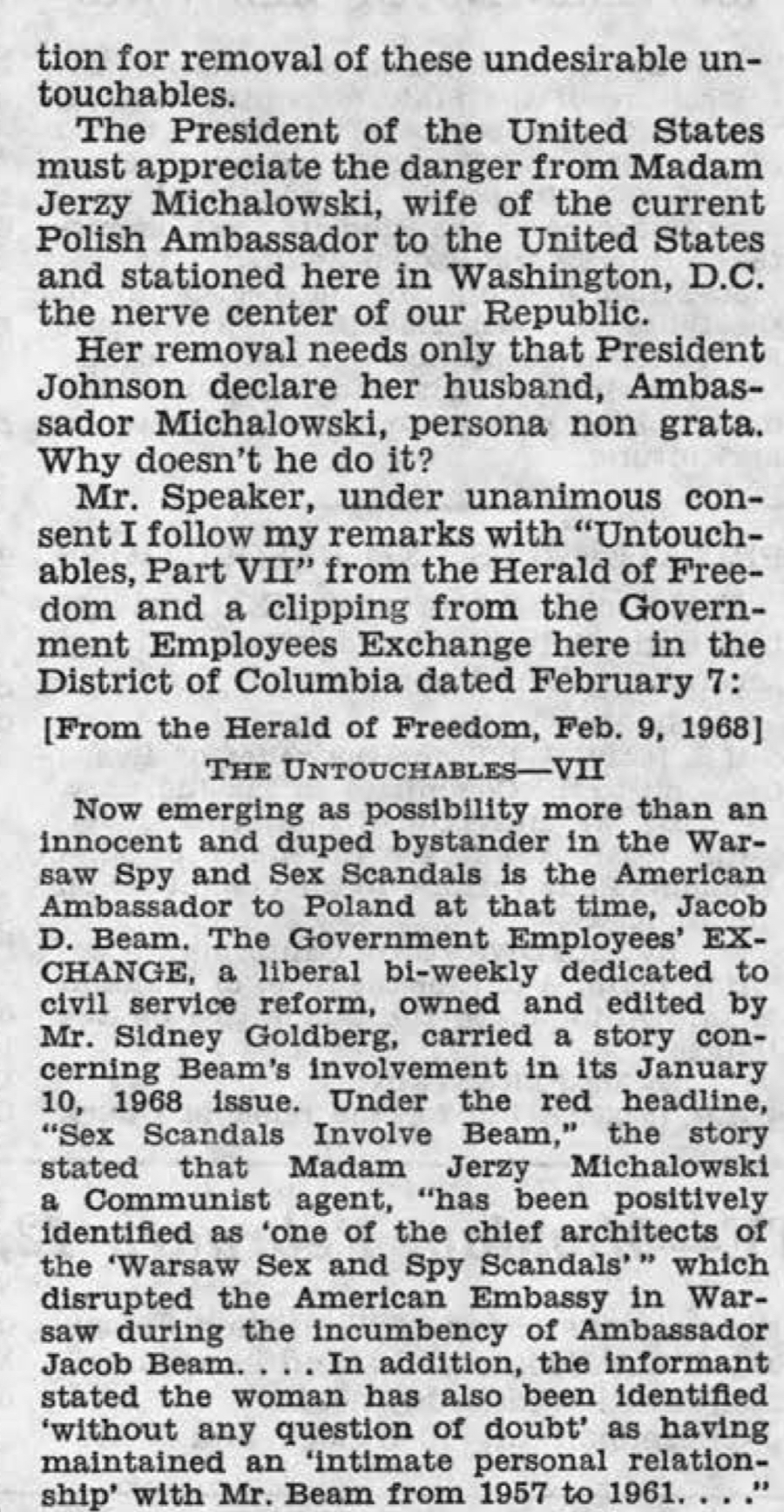Soft Propaganda by Former Voice of America Editor Targeted Americans in Support of Communist Regime
Mira Złotowska, later known as Mira Michałowska, who during the Cold War published books and articles in English in the United States and in Great Britain as Mira Michal and used several other pen names, was one of many radically left-wing journalists who had worked in New York on Voice of America (VOA) U.S. government anti-Nazi radio broadcasts in the Office of War Information (OWI) during World War II while also helping to spread Soviet propaganda and censoring news about Stalin’s atrocities. She left her VOA job in early 1945 to work as a research assistant for Time magazine and in 1946 wrote a highly effective and highly misleading soft propaganda article for Harper’s magazine in support of the communist-dominated regime in Poland. She was also accused of spying on American diplomats and was linked to efforts by the communist regime’s security services to shut down Polish broadcasts of U.S. government-funded Radio Free Europe (RFE)—one of the few American-supported Western institutions that could not be fooled by communist propaganda or by a foreign agent of influence in the United States who presented herself as a “newspaperwoman.”
See ColdWarRadioMuseum.com For More About Złotowska-Michałowska
As the wife of a high-ranking Polish communist diplomat, Jerzy Michałowski, whom she had married shortly after World War II, she changed her name from Złotowska to her new married name Michałowska and published articles in Great Britain and in the U.S. Obscuring her real identity as the wife of a communist ambassador, she tried to win sympathy and support in the West for the ruling elite in Poland which she and her husband had joined. Her job, which she performed brilliantly because she understood the mentality of Western liberal elites was to convince them that the regime in Warsaw, which her husband had served even during the most repressive Stalinist period, was not much different than any other government and was just as socially progressive as left-leaning Western intellectuals wanted their own governments in their own countries to be. In her writing, she rarely resorted to outright lying and instead skillfully mixed facts with half truths to get her articles published by editors of American news magazines. They were inclined to believe what she wrote and were easily manipulated, as were some American readers of her reportages and her books.
The success of her soft propaganda targeting Americans depended on obscuring her background and her true motives–not unlike what Russian propagandists are doing today in their attempts to manipulate public opinion and interfere in politics in the United States and in other countries. Gullible American and British publishers of her articles and books knew about her links to the communist regime in Poland but usually chose to hide it or were vague in the bios they had for her for their readers.
In Poland after the war, Mira Michałowska helped to expose Polish readers to American culture through her magazine articles and translations of books by American authors. One of the American writers she translated was her former VOA colleague and friend, the 1953 Stalin Peace Prize winner Howard Fast who in 1943 was VOA’s chief news writer and editor. he was later a Communist Party activist and editor of the party newspaper The Daily Worker.[ref]Cold War Radio Museum, “Created 70 years ago, Stalin Peace Prize went in 1953 to former Voice of America chief news writer Howard Fast ,” December 21, 2019, https://www.coldwarradiomuseum.com/created-70-years-ago-today-stalin-peace-prize-went-in-1953-to-former-voice-of-america-chief-news-writer-howard-fast/. Michałowska helped the Communist Party develop modern television programs in Poland. One of her books was turned into into a highly popular 1960s Polish television serial.[/ref]
Mira Michałowska also played a key role in the late 1950s in charming U.S. Ambassador to Poland Jacob Beam and most likely was responsible for persuading him to demand the closing down of the Polish Service of Radio Free Europe, which he claimed had become an obstacle to gradual democratization in Poland and to good relations between Washington and the communist government in Warsaw. Her efforts were part of a Polish communist intelligence service’s operation directed against the U.S. Embassy in Warsaw, which also involved spying on VOA’s jazz radio DJ Willis Conover during his 1959 visit to Poland. The primary target of the spying operation in addition to Ambassador Beam was the first secretary of the American Embassy Thomas Donovan. The Polish secret police used for spying on him and Willis Conover a different female agent, Teresa Trzaskowska, who happened to be the future mother of Rafał Trzaskowski, the current mayor of Warsaw and the unsuccessful candidate in the 2020 presidential election in Poland. The main objective of the spying and influence operation was to use American diplomats in Warsaw to get the U.S. administration in Washington to silence Radio Free Europe Polish programs. Communist officials were willing to tolerate the Voice of America as being far less effective and less dangerous to their undemocratic and repressive rule. By the late 1950s, they were no longer afraid of some forms of Western cultural influence, including jazz, which explained how Michałowska was able to publish in Poland articles and books about American culture and why VOA’s jazz DJ Willis Conover was allowed to visit Poland while still being spied on as part of the effort to achieve a change of U.S. government policy toward the communist government in Warsaw.[ref]Tadeusz Lipien, “Communist secret police in Poland spied on Voice of America’s Willis Conover to shut down Radio Free Europe,” TadeuszLipien.com, August 16, 2020, https://www.tadeuszlipien.com/communist-secret-police-in-poland-spied-on-voice-of-americas-willis-conover-to-shut-down-radio-free-europe/.[/ref]
While the Polish communist intelligence operatives managed to obtain some classified documents from the U.S. Embassy in the late 1950s, Ambassador Beam’s efforts to shut down RFE Polish broadcasts were ultimately unsuccessful. RFE’s leadership and Eisenhower administration officials in Washington rebuffed his demands. Vice President Richard Nixon who understood the power of RFE broadcasts to Poland reportedly told Beam in 1959 that the job of a U.S. ambassador is not only to represent the United States to the foreign government but also to the people of the communist-ruled nation.[ref]Vice President Richard Nixon, who was greatly impressed by the enthusiastic reception he got on his 1959 visit to Warsaw from ordinary Polish people who had learned about the route of his motorcade from Radio Free Europe Polish broadcasts, reportedly told Beam to stop his anti-RFE campaign, explaining to him that it was also “an American diplomat’s responsibility to maintain a close relationship with the people.” Arch Puddington, Broadcasting Freedom: The Cold War Triumph of Radio Free Europe and Radio Liberty (Lexington: The University Press of Kentucky, 2000) 125-126. Also see: Yale Richmond, “Nixon in Warsaw,” American Diplomacy, November 2010, http://americandiplomacy.web.unc.edu/2010/11/nixon-in-warsaw/.[/ref]
A declassified 1959 Radio Free Europe document included some of the arguments used against RFE, which were most likely fed to U.S. diplomats in Warsaw by Mira Michałowska. William E. Griffith, whose conversation with Thomas Donovan is described in the report, was the chief political adviser at Radio Free Europe in Munich when it was still operated by the Central Intelligence Agency and later a professor at the Massachusetts Institute of Technology (MIT).
Mira Złotowska-Michałowska had worked hard for many years to win support for the pro-Soviet government in Poland among Western publics, journalists and diplomats, but she also enjoyed all the privileges of the communist elite and did not seem to be willing to give them up for the sake of revealing the whole truth as a journalist. She excelled in practicing journalism based on facts and half-truth, which made her propaganda targeting Americans much more effective than if she had followed the path of her former Voice of America colleague Stefan Arski, aka Artur Salman, who after resigning in 1947 from VOA, which was then in the State Department, also went back to Poland and produced virulent anti-U.S. propaganda consisting of attacks on his former employer, the Voice of America, as well as on Radio Free Europe, the U.S. Congress and Polish immigrants in the West who chose not to return to their native country under communist rule.[ref]Ted Lipien, “Voice of America Polish Writer Listed As His Job Reference Stalin’s KGB Agent of Influence Who Duped President Roosevelt,” Cold War Radio Museum, https://www.coldwarradiomuseum.com/voice-of-america-polish-editor-listed-stalins-kgb-agent-of-influence-as-job-reference/.[/ref] This former Voice of America journalist wrote in his book Uwaga! Radiodywersja! (“Warning! Sabotage!”) that Radio Free Europe was created by “the flower of dark reactionary America, fascism and rapacity.”[ref]Stefan Arski, Uwaga! Radiodywersja! (Warsaw, 1953), p. 25 as quoted by Justyna Kańczukowska, Instytut Historyczny, Universytet Wrocławski, “Propaganda komunistyczna w okresie stalinowskim i w czasie stanu wojennego wobec Rozgłośni Polskiej Radia Wolna Europa. Próba porównania,” p. 42. https://www.polska1918-89.pl/pdf/propaganda-komunistyczna-w-okresie-stalinowskim-i-w-czasie-stanu-wojen,4656.pdf.[/ref] In news magazine Świat, which Arski edited, he published articles by Zbigniew Juliusz Brydak who in the early 1950s spied on Radio Free Europe and Voice of America journalists in Munich, West Germany, where he was employed in the VOA bureau to record VOA programs to Poland using his radio name Stefan Michalski. After his return to Poland, Brydak attacked Voice of America in broadcasts by communist radio station KRAJ which targeted Poles living in the West, while Arski published books denouncing Radio Free Europe, VOA and anti-communist Polish journalists who worked at these stations during the Cold War.[ref]According to Marek Walicki, my deputy in the VOA Polish Service in the 1980s, who knew Brydak in Poland and in Munich, Brydak was an agent provocateur who was responsible for the arrest, torture and death of several young Poles whom he had denounced to the communist security service. Marek Walicki, Z Polski Ludowej do Wolnej Europy (Warsaw: Bellona, 2018), 170-182.[/ref]
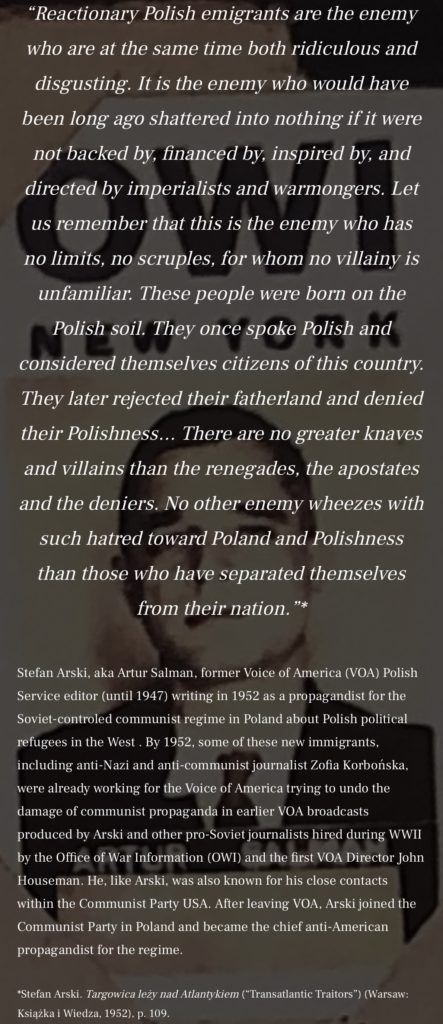
Złotowska-Michałowska’s pro-communist regime propaganda was much more sophisticated and used none of the abusive criticism found in Arski’s newspaper articles and books published in Poland after 1947.
One classic example of her effective soft propaganda journalism in the United States was Złotowska’s article, “I Came Back from Poland,” which she wrote for Harper’s magazine in 1946. The article was not ostensibly political. It consisted of nearly a dozen powerful one paragraph descriptions of daily life in post-war Poland. It was designed to elicit sympathy for Poland among Americans, but its purpose was also to get Americans to support the communist-dominated government by presenting it in a subtle message as being fair, law abiding and above any criticism. In that respect, her article was similar to World War II Voice of America propaganda broadcasts which carefully avoided any information about Stalinist crimes and Soviet Russia’s aggressive ambitions against its neighbors.
In the Ministry of Foreign Affairs in Warsaw there is a room where four secretaries pound their typewriters. It was summer when I saw them and the girls were wearing light summer dresses with short sleeves. Each of them had a concentration camp number tattooed on her forearm. On the window hung a sign written in big, clumsy letters. It said: “ladies in this room do not wish to have their hands kissed.”
Mira Złotowska, “I Came Back from Poland,” Harper’s, November 1946.
Mira Złotowska-Michałowska did not use crude propaganda language of her friend from the Voice of America Stefan Arski or denunciations used by communist spy Zbigniew Brydak against VOA, his former employer. Her 1946 article for Harper’s magazine was brilliantly written. Harper’s presented her to its readers as a former broadcaster for OWI–the Office of War Information–which meant that she had worked on Voice of America wartime programs to Poland. During World War II the Voice of America name was not yet commonly used for OWI radio broadcasts.
For the past year and a half she has been on the staff of Time magazine doing editorial research. She visited Poland for three months this past summer, for Time and for the publishing house Reynal & Hitchcock. “I Came Back from Poland” grew out of that visit.
Harper’s, November 1946.
Her article’s propaganda message in support of the communist and Soviet-dominated government was subtle but effective. She wrote about a militiaman in Poland whom she presented as a staunch defender of the rule of law. “We are not a nation of criminals,” she quoted the communist militiaman telling a Polish peasant, whom she presented as a somewhat reactionary figure, that even Nazi criminals deserved a fair trial.[ref]Mira Złotowska, “I came back from Poland, Harper’s, November 1946, https://harpers.org/author/mirazlotowska/.[/ref] At the time, Communists with the help from the Soviet NKVD were already imposing a harsh dictatorial regime in Poland, falsely accusing former anti-Nazi fighters of being fascists, arresting and torturing their political opponents and condemning them to death with fake evidence. They were also getting ready to expropriate and collectivize private farms.
Had Mira Złotowska chosen to be an honest journalist, her privileged status in Poland would have been finished and her future husband’s diplomatic career would have been over. Harper’s‘ editors were also at fault for not including information about ongoing Soviet and communist assaults on human rights and democracy in Eastern Europe. It was a classic example of ideologically motivated collusion between a foreign propagandist and left-leaning segments of American media without a full disclosure of the writer’s true intentions and without adding critical background information she had chosen to omit from her article.
The price of obscuring the truth was in the long run much higher for the Western publics misled by such propaganda, and especially for the people in Poland, than honest news reporting would have been during and immediately after World War II if some of the more gullible Western journalists and editors were capable of seeing the truth and reporting it honestly.
Americans reading Złotowska’s article in Harper’s magazine would have to conclude, if they did not consult any other sources, that Poland had a law-abiding independent government and faced with many problems of post-war reconstruction deserved full and unconditional support from the United States. The Polish people certainly deserved support from the United States having been sold down the river to Stalin by President Roosevelt and British Prime Minister Winston Churchill, but throughout the Cold War it was difficult to separate support for the people from support for the communist regime. It took some time for American diplomats to figure it out and they still made mistakes from time to time.
Almost all of what Mira Zlotowska wrote brilliantly in her article for Harper’s magazine about the suffering of Poles and Jews under the German occupation and about their post-war problems was completely true, but some critical facts were missing. There was nothing in her article on the brutality of the Soviet control of Poland and repressions against political opponents by local communists. The real political situation in Poland in 1946 was quite different from what American readers might have gathered from Złotowska’s article. A summary of the atrocities committed by the Soviet occupation forces and by the communist regime in Poland can be found on the website of the Estonian Institute of Historical Memory, an international non-governmental and academic research institution. Citing multiple books and articles by Polish scholars, the Estonian think-tank noted that “In 1945 about 40,000 – 50,000 people from Polish territories were deported to forced labour camps in the USSR.” [ref]CommunistCrimes, “Communist Occupation and Dictatorship in Poland (1939-1941; 1944-1989),” Estonian Institute of Historical Memory, https://communistcrimes.org/en/countries/poland.[/ref]
The system of forced labour camps was established in 1945 and by 1950 there were 206 camps on Polish territory. The number of inmates is estimated at around 300,000. The last camps were closed in 1958. The number of political prison sentences between 1944 – 1956 is unknown, though at one point there were up to 50,000 political prisoners in the system. In the aforementioned time period, about 3,500 death sentences were imposed for political reasons, of which over 2,500 were carried out. On top of that, over 20,000 inmates died in prisons and labour camps. The overall number of victims of the 1944-1956 period is estimated at around 50,000.
CommunistCrimes, “Communist Occupation and Dictatorship in Poland (1939-1941; 1944-1989),” Estonian Institute of Historical Memory, https://communistcrimes.org/en/countries/poland.
As the wife of the Polish communist ambassador to the United States, Michałowska continued to write cultural soft propaganda articles for Harper’s and a few other American magazines. In her 1958 book, Nobody Told Me How, published in the U.S. in 1962, she tried to win greater Western acceptance for the communist government in Poland by presenting its diplomats and its diplomatic service as not much different from Western diplomatic services. The U.S. publisher of her book, J. B. Lippincott, identified her as the wife of the Polish ambassador to Great Britain but did not use the word “communist.” The description on the book’s cover said that “Miss Michal worked on the Polish desk of the O.W.I., writing news broadcasts and features for Polish consumption, and when the war was over she worked for two years as a researcher for Time.”
Her article “The Almost Perfect Cook” published in the September 1958 issue of Harper’s magazine had the same theme. Harper’s‘ editors wrote that Mira Michal was “the thinly disguised pen name of a Polish newspaperwoman whose husband now represents his country at the United Nations in New York.”[ref]Harper’s, “Personal and Otherwise,” September 1958, p. 23.[/ref] She also published articles in Vogue, The Atlantic, and The Virginia Quarterly Review. The Atlantic identified her as “The wife of a foreign diplomat” but did not specify from which country.
This former Voice of America journalist and newspaperwoman was, however, exposed by some conservative U.S. publications in the late 1960s as a particularly effective agent of influence for the communist regime, and possibly a dangerous spy. Her ex husband, nuclear physicist Ignacy Złotowski had been accused earlier by a high-level Polish defector as working shortly after the war as an atomic spy in the United States under a diplomatic cover. While working for the Office of War Information and on VOA broadcasts during World War II, she and her colleague Stefan Arski were in contact with at least two known Soviet agents of influence, Marxist economist Oskar R. Lange, who after the war was the communist regime’s first ambassador in Washington, and KGB communist agent in the United States Bolesław (Bill) Gerbert who also later became a communist diplomat. While still employed by the U.S. government, Złotowska and Arski helped publish a propaganda pamphlet in English advocating for introducing radical socialism in Poland after the war.[ref]Ted Lipien, “Voice of America Polish Writer Listed As His Job Reference Stalin’s KGB Agent of Influence Who Duped President Roosevelt,” Cold War Radio Museum, February 12, 2020, https://www.coldwarradiomuseum.com/voice-of-america-polish-editor-listed-stalins-kgb-agent-of-influence-as-job-reference/.[/ref]
In 1968, Michałowska was described in an article inserted by a member of Congress in the Congressional Record as “a thoroughly modern Mata Hari,” a reference to the famous courtesan who was executed in France during World War I on charges of spying for Germany.[ref]John R. Rarick, “The ‘Untouchable” Parade,” 114 Cong. Rec. (Bound) – Volume 114, Part 3 (February 8, 1968 to February 22, 1968), Extension of Remarks, February 5, 1968, in the House of Representatives, Thursday, February 8, 1968, 2860-2861, https://www.govinfo.gov/content/pkg/GPO-CRECB-1968-pt3/pdf/GPO-CRECB-1968-pt3-1-2.pdf.[/ref] Whether she was spying or not, she was definitely involved in the ultimately unsuccessful business of trying to split the Polish-American community and in trying to get support for the regime among non-Polish Americans. Strongly anti-Soviet and anti-communist Democrat from Louisiana, Rep. John R. Rarick, a decorated World War II veteran but also a segregationist, did not want State Department diplomat Jacob Beam to be confirmed as the U.S. Ambassador to Moscow. In 1969, Rarick repeated his warnings on the floor of the House of Representatives about Beam’s alleged romantic relationship with Mrs. Michałowska when he was the U.S. ambassador in Warsaw ten years earlier.[ref]John R. Rarick, 115 Cong. Rec. (Bound) – Volume 115, Part 3 (February 5, 1969 to February 21, 1969), “Untouchables Undaunted” – Jacob Beam in the House of Representatives, February 5, 1969, 2970-2973, https://www.govinfo.gov/content/pkg/GPO-CRECB-1969-pt3/pdf/GPO-CRECB-1969-pt3-1-2.pdf.[/ref]
Despite today’s Russian government’s attempts under President Vladimir Putin to undermine journalism with disinformation, the Voice of America has never officially acknowledged its mistakes in allowing pro-Soviet propagandists to take control of its programs for several years during World War II. Recently 14 Voice of America central English newsroom editors, reporters and correspondents wrote in a protest letter against the new agency head who tried to implement stricter security screenings for VOA hires that “just as was the case with the McCarthy ‘Red Scare,’ which targeted VOA and other government organizations in the mid-1950’s, there has not been a single demonstrable case of any individual working for VOA — as the USAGM CEO puts it — ‘posing as a spy’.” I wrote in an op-ed that these VOA newsroom editors and reporters are dangerously naive considering what Vladimir Putin and communist China are doing to journalists, not only in their countries but also abroad. Authoritarian leaderships have a long reach and are determined to silence and intimidate their critics. But these opponents of free press also rely on naive or ideologically blinded Western journalists to do their work for them in manipulating public opinion and in interfering with democratic politics abroad.
Eventually, under pressure from congressional and other critics, which resulted in hiring anti-communist refugee journalists such as Polish anti-Nazi underground resistance figure Zofia Korbońska, the Voice of America was reformed in the early 1950s and made a significant contribution to the fall of communism in East-Central Europe although not as consistently and not as significantly as Radio Free Europe.
I can make this claim because I had listened to both RFE and VOA while living in Poland under communism in the 1960s and later still had to listen to RFE to find out what was happening in Poland while I was already working for VOA in the 1970s and the 1980s. Mira Michałowska and her communist diplomat husband may have eventually recognized some of the crimes of the regime and may have tried to moderate the impact of communism on their fellow citizens by promoting a greater economic and cultural opening to the West. They were eventually sidelined by the regime they had served, but they never publicly condemned it.
The Voice of America, where Mira Złotowska and Stefan Arski during World War II promoted radical socialism in post war Poland and the establishment of a pro-Soviet government, eventually contributed to the fall of communism in Eastern Europe and to the collapse of the Soviet Union in the early 1990s.
